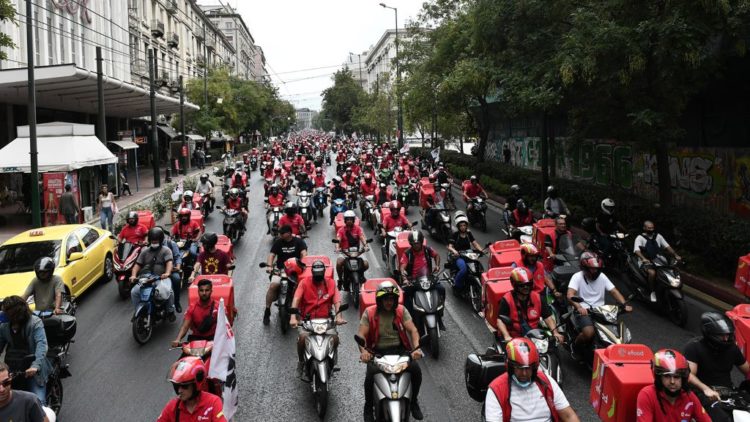International Affairs Committee
New Left Current for Communist Liberation
A big, strike took place these days in Greece. The employees-deliverymen in the company efood, the largest ordering and food distribution platform in Greece, overturned within a week the plan of their employers to turn them from employees into freelancers or “partners” according to the official language of the company. Of course such a change in their employment contracts would mean that the deliverymen of efood would be left without a series of employment rights (paid insurance, allowances etc.). It should be noted here that efood is not a company in crisis, which is trying to reduce its costs, but a company whose profits have skyrocketed during the pandemic period and one which has expanded its business gaining a huge share of the market. Efood, initially offered just an online food-ordering platform, withholding a percentage from the sales of its partner-shops. However, later, it created its own fleet of deliverymen which was offered to businesses that did not have their own delivery personnel or preferred working with the efood fleet instead of having their own.
In mid-September, the company with a very aggressive move sent thousands of sms to its deliverymen-employees calling them to change their status passing to the freelancing regime otherwise their contracts would not be renewed.
This provocative move, in its essence but also in its verbal expression, created an outburst of rage against efood. This explosion was initially expressed on social media with the hashtag #cancel_efood becoming dominant on twitter and other social networking platforms which was followed by the downgrading of the company’s rating on Google’s application platform. Efood’s rating fell from 4.7 out of 5, to 1 out of 5, within 24 hours. Thousands of users/clients uninstalled the application and left angry comments wherever possible heavily criticizing the company. The wave of solidarity with efood employees was escalating so rapidly that the company was forced to react by issuing a press release apologizing for the wording of its initial sms sent to its workers and arguing that while the company continued to propose the conversion to freelancing, it would not force any employee to do so.
Instead of calming down, however, the reactions intensified. At this point, the involvement of the unions and syndicates played a decisive role. Two unions, the Bicycle Drivers ‘Employees’ Base Association (ΣΒΕΟΔ/SVEOD) and the Food-Tourism Syndicate, intervened both in the public debate, revealing the company’s real goals and methods, as well as in the level of staging actions, calling efood employees initially on strike and later on in a 24-hour strike and motorcade. The result was impressive. A huge motorcade in Athens and smaller but important ones in Thessaloniki, Patras, Heraklion and Chania took place. What’s more the motorcades were characterized by a large participation of efood employees and deliverymen from other companies and other workers that came in solidarity. The demonstration had dynamism and significant popular acceptance. Many people who were appreciative of the social contribution of the deliverymen during the lockdown periods and others who saw in their case their current or possible future working status supported their struggle.
The two unions that organized and supported the efood workers’ struggle demanded the withdrawal of the “freelancing” labor system under the slogan “We are workers and not partners” while adding a number of other demands, such as the inclusion of deliverymen in the special regime for heavy and unhealthy work.

As a result of all the above, the night before the strike, the company announced that it acknowledged its mistake, accepted the criticism and thus converted thousands of employment contracts from short-term to indefinite. That was the end of the “Freelancing” experiment for efood. Despite the announcement of the company, the strike protest took place with great success and in a festive atmosphere. An important victory of a workers’ struggle with strong solidarity from society was now a fact.
The victory of efood employees gave optimism to all other employees in Greece, especially for those who fall into the range of ‘’flexible’’ working conditions, and moreover it was a blow to the government. The company’s intention to convert the employment status was based on a recent law of the Greek government, which further facilitated the prevalence of this type of employment conditions. The case of efood revealed the savage moods of the employers and destroyed the image that the companies in this specific industry were trying to create for themselves. What’s more, this fight was the “Greek episode” of a series of labor struggles in European countries, such as that of the employees of the respective company “Deliveroo” in England.
Working at a grassroots level and confronting the new working models promoted by the European Union and capitalist governments can bring together not only the workers of a specific sector but also a wide range of supporters. It can result in the expression of social discontent. All in all, the struggle against employers and the strategic choices of the bourgeois state, under slogans such as “bosses should lose their profits so that we can live”, can open broader discussions about life and work. Such, that come to the question of a modern socialist model for the organization of society.


















